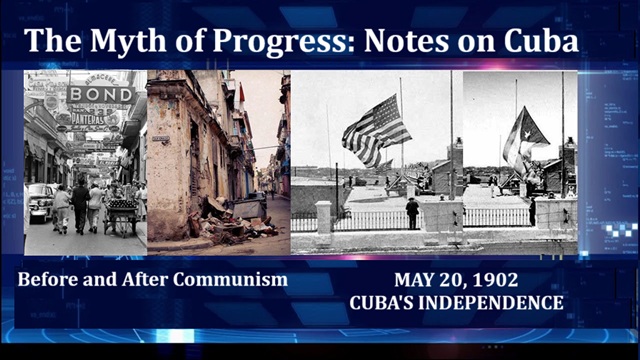 The Myth of Progress: Notes on Cuba Before and After Communism
The Myth of Progress: Notes on Cuba Before and After Communism
A comparative analysis of Cuba in healthcare, education, and labor conditions before and after 66 years of socialist regime, dismantling the myths about revolutionary achievements.
123 Years of Independence: Two Contrasting Realities
May 20, 2025 marks the 123rd anniversary of Cuba's independence. Of this total, only 27 years corresponded to a republic that, although imperfect, built a prosperous and modern nation. This period, despite including two authoritarian episodes, contrasts dramatically with the subsequent 66 years under a communist totalitarian regime that has plunged the island into a profound material, spiritual, and moral crisis.
For more than six decades, Castroism has transformed Cuba into a scenario of repression, pain, and widespread misery, where the most basic liberties have disappeared. The regime has survived, transitioning from being an instrument of international communism to becoming, after the fall of the Soviet bloc, a promoter of these ideas through initiatives such as the São Paulo Forum.
The Regime's Survival Mechanisms
How has it managed to stay in power for so long? The answer lies in two main areas:
Internally, through a sophisticated apparatus of state terrorism and an impressive espionage network that has infiltrated all opposition groups.
Externally, obtaining the support of the international community through extensive disinformation campaigns that have projected a distorted image of Cuban reality.
To achieve this manipulation, the Castro regime has needed to deconstruct history, systematically falsifying the achievements of the republican stage prior to 1959.
Three Great Myths of Castroism
Official propaganda has concentrated its efforts on three fundamental areas: health, education, and labor conditions. The strategy consists of conducting static analyses that deliberately ignore historical evolution and contextualized comparisons over time. Let's examine the evidence that dismantles these myths:
1. The Myth of Revolutionary Healthcare
Infant Mortality
An indicator frequently cited by the regime is infant mortality. However, historical reality shows surprising data:
- In 1957, Cuba recorded 32 deaths per thousand live births
- This figure was lower than countries such as France, Belgium, Austria, Japan, Spain, Italy, and Luxembourg
While Cuba was at the forefront of this indicator before the revolution, it has now been surpassed by these same countries that were previously at a disadvantage.
National Mortality Rate
Regarding adult mortality (between 15 and 60 years), pre-revolutionary statistics are equally revealing:
- In 1956, Cuba recorded 5.8 deaths per 1,000 inhabitants
- This figure was lower than developed nations such as Finland, the United States, Sweden, Iceland, and Israel
Physicians per Capita
Another statistic manipulated by Castro's propaganda is the availability of healthcare professionals:
- In 1957, Cuba had 1.01 physicians per thousand inhabitants
- This proportion exceeded countries such as Norway, Sweden, Great Britain, Finland, Ireland, and Spain
2. The Educational Falsehood
Literacy Rates
The regime has made the literacy campaign one of its main propaganda standards. Nevertheless, official pre-revolutionary figures reveal:
- In 1953, 78% of Cubans over 15 years old knew how to read and write
- This rate was significantly higher than countries such as Bolivia (32%), Dominican Republic (43%), and Brazil (49%) in 1950
While these countries have managed to exceed 90% literacy today—with Bolivia nearly tripling its rate—Cuba has maintained a relative stagnation that contradicts the supposed "superiority" of the Castro educational model.
Higher Education
Regarding access to university education, statistics prior to the revolution are even more compelling:
- In 1957, 3.5% of the Cuban population accessed higher studies
- This proportion doubled that of Japan, tripled that of France, quadrupled that of Italy and Germany, and was five times greater than that of England
Female Participation in Education
Gender equality in educational access, another supposed revolutionary achievement, also existed notably before 1959:
- In 1955, women represented 45% of school enrollment in Cuba
- This percentage exceeded that of developed countries such as Finland, the United States, Canada, the United Kingdom, Denmark, Sweden, Norway, and Belgium
3. Labor and Wage Conditions
Labor Remuneration
The treatment of Cuban workers has been another area of historical manipulation. Pre-revolutionary figures demonstrate:
- In 1956, 64% of Cuba's GDP was allocated to worker remuneration
- This proportion placed Cuba in fifth place worldwide, only behind the United Kingdom, the United States, Canada, and Sweden
This data contrasts dramatically with the current systematic exploitation of Cuban labor, characterized by miserable wages, lack of opportunities, and workplace discrimination.
Agricultural Wages
Rural workers also enjoyed comparatively favorable conditions:
- In 1958, a Cuban agricultural worker received a daily wage of approximately 3 dollars
- This amount was equivalent to more than half of the American agricultural wage
- It exceeded what a peasant earned in West Germany, Ireland, and Denmark
Conclusion: The Great Communist Lie
An objective analysis of this historical data confirms that the supposed achievements of the Castro revolution do not exist and have constituted an elaborate disinformation campaign. Far from advancing, Cuba has experienced a generalized setback in all relevant indicators when the passage of time and comparative progress are properly considered.
The regime has deliberately promoted political and historical "illiteracy" to maintain its narrative. Therefore, when commemorating this May 20th, it is essential to remember and reclaim the true history of Cuba: a nation that was already prosperous and advanced before falling under the totalitarian yoke that has oppressed it for 66 years.
On this anniversary of Cuban Independence, the yearning remains the same: a free Cuba, without communism, and with the recovered dignity that characterized its best moments as a sovereign republic.
© The CubanAmerican Voice. All rights reserved.
 🖋️Author Julio M. Shiling
🖋️Author Julio M. Shiling
Julio M. Shiling is a political scientist, writer, columnist, lecturer, media commentator, and director of Patria de Martí and The CubanAmerican Voice. He holds a master’s degree in Political Science from Florida International University (FIU) in Miami, Florida. He is a member of The American Political Science Association, The PEN Club (Cuban Writers in Exile Chapter) and the Academy of Cuban History in Exile.
Follow Julio on:
📚Published books 📺In the media 👨🏫 Conferences and Symposiums 🎙️Podcast The Shiling Summary

